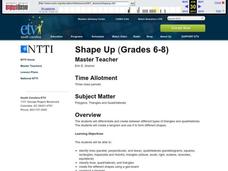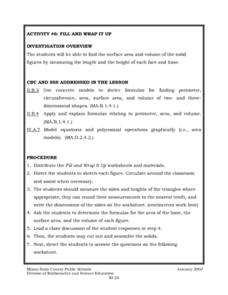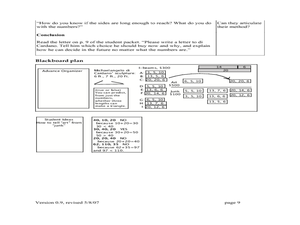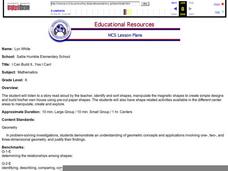Curated OER
Shape Up
Students explore differents types of triangles and quadriaterals. In this polygon lesson, students model identify and compare two and three dimensional geometric figures. Students create tangrams and discover the difference between...
Curated OER
Square Corners
What type of corners does this shape have? Young geometers examine 12 shapes, circling the square corners in each if they have any. There are two examples demonstrating this concept, but be sure scholars understand the difference between...
Curated OER
Countdown Challenge: Platonic Solids - Part I
Use a Platonic solids worksheet to record the number of faces, edges, and vertices of five polyhedra whose faces, edges, and vertices are all identical. For each figure, learners write a proof of Euler's formula (F+V=E+2). They create a...
Curated OER
Naming Geometric Shapes
Name that shape! This simple worksheet has learners identify each geometric figure. They examine rectangular prisms, cylinders, rectangular pyramids, and hexagonal prisms. This one-page worksheet contains 8 problems, and the goals seems...
Curated OER
Explorations with Shapes
Students describe, identify and compare two-dimensional figures. They also name and demonstrate the relative position of objects using directional words. They sort and compare two-dimensional figures and three-dimensional objects...
Curated OER
Learn the Shapes
Students examine and identify the similarities and differences of two-dimensional shapes. They play an I-Spy shape game, participate in a classroom Shape Search, and create illustrations of shapes for a shape collage.
Curated OER
Draw It!
Students follow directions to make two- and three-dimensional shapes. Focusing on polygons, they use the shapes to solve real-world problems and review with the class. They read two of Shel Silverstein's poems and discuss the...
Curated OER
Shapes Around Us
Students create posters about geometric shapes in order to demonstrate their understanding of the different shapes. Students look for pictures in magazines to represent two-dimensional shapes, paste them on a poster, label the shape,...
Curated OER
I've Seen That Shape Before
Students identify geometric solids. In this shape lesson, students explore the characteristics of geometric solids. They locate pictures of shapes on the internet, and identify the shapes. Students draw pictures of shapes, take...
Curated OER
Grade 2: Roll or Slide?
Second graders organize solids into categories, depending upon whether they will roll, slide or do both on a home made ramp. Students describe and compare attributes of three-dimensional geometric solids.
Teach Engineering
Seeing All Sides: Orthographic Drawing
How can your draw three-dimensional figures on paper? The lesson shows pupils how to draw orthographic projections of three-dimensional figures composed of cubes. After viewing a PowerPoint presentation, they practice this skill with...
National Security Agency
Classifying Triangles
Building on young mathematicians' prior knowledge of three-sided shapes, this lesson series explores the defining characteristics of different types of triangles. Starting with a shared reading of the children's book The Greedy Triangle,...
Curated OER
2-D Geometry
Third graders describe and compare attributes of two-dimensional shapes. They explain geometric terms, angles and shapes. Students demonstrate each vocabulary word with their body and they mirror the body positions associated with each...
Curated OER
Line and Shading = Shape and Form
Students collect natural objects and draw these objects with and without shading.
Curated OER
Cap-It to the Max
Eighth graders compare the volume of three cylinders constructed from the same size sheet of paper. They use concrete and graphical models to derive formulas for finding perimeter, circumference, area, and volume of two and three...
Curated OER
Fill and Wrap It Up
Students find the surface area and volume of the solid figures by measuring the length and the height of each face and base. They use concrete models to derive formulas for finding perimeter, circumference, area, surface area, and volume...
Curated OER
Art or Junk? Discovering the Triangle Inequality
Middle schoolers study the triangle inequality. They will identify, compare, and analyze attributes of two and three-dimensional shapes. Then they develop vocabulary to describe the attributes. They also use manipulatives to analyze the...
Curated OER
Who Am I? (Middle School)
Third graders complete a classroom game used to build understanding of two and three-dimensional shapes. Diagonals, sides, regularity, congruency, angle measurements, parallels, perpendicular, faces, and edges are a few of the vocabulary...
Curated OER
Pass It On
Fifth graders participate in a class activity that helps them learn some geometric terms along with their definitions. They describe relationships between two and three-dimensional shapes and analyze attributes and properties of...
Curated OER
Introduction to Minerals
Students discover how crystal structures go together to create minerals. For this earth science lesson, students work in groups to create 3-dimensional shapes of crystals that they then put together in a compact structure.
Curated OER
I Can Build It.....Yes I Can!
Kindergartners listen to a story read by their teacher, then use magnetic shape pieces to construct simple designes. They "build" their own house using pre-cut paper shapes. This age-appropriate lesson plan would be an excellent choice...
Curated OER
Branding Circles, Squares, Rectangles, Triangles
Compare and classify 2-D shapes! Kindergarteners inspect the attributes of plane shapes and examine shapes in everyday life. They label the circles, squares, rectangles, and triangles they find. This is the website where you can find the...
Curated OER
Copy Cat
Students examine a Webmath page, and demonstrate how to copy and paste. They create a computer-generated template page presenting the attributes of two- and three- dimensional shapes.
Curated OER
Putting It All Together
Students complete activities to learn about the shapes and their vertices. In this shape recognition instructional activity, students discover the rule linking the number of sides with the number of vertices for shapes. Students...

























